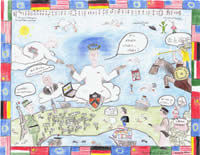|
TEACHING/STUDENTS
| For an original
artwork by doctoral candidate Mareike
Kleine on the subject of Moravcsik's
scholarship, click here. |
 |
During the academic year 2022-2023, he will teach Politics 551 ("Graduate Seminar: International Politics") and Politics 240/SPIA 312 ("International Relations"). During 2023-2024, he will be on leave.
For a short video from the Open University of Professor Moravcsik explaining Liberal International Relations Theory, click here.
For a transatlantic Princeton-LSE video-conference debate between Profs. Simon Hix (LSE) and Andrew Moravcsik (PU) on the question of whether there is a "democratic deficit" in the EU, click here.
For a video feature about the seminar on public affairs in the EU, please click here.
Contact
Information for Graduate Students
Politics 551. International Relations Theory
Research
Seminar in International Relations
Woodrow Wilson School 556c. The Politics and
Foreign Policy of the European Union
Historical
Study A-12. International Conflict and Cooperation
in the Modern World
Government
90cl. Human Rights in World Politics
Government
90cv. European Integration
Government
2009. Methods of Political Analysis
Government
2180. Democracy and Accountability in the New
Europe
Government
2710. International Relations: Field Seminar
Government
2755. International Political Economy
Contact
Information for Graduate Students
Christopher
Darnton (Princeton)
Politics 551. International Relations Theory
An introduction to international relations theory at the graduate level.
Research
Seminar in International Relations
Click
here for seminar web site.
Woodrow
Wilson School 556c. The Politics and Foreign
Policy of the European Union
Click
here for course materials.
Historical
Study A-12. International Conflict and Cooperation
in the Modern World
Why do states wage war? Why do they cooperate?
Have the answers changed historically? Are economic
globalization, ecological interdependence, and
global civil society eroding traditional state
sovereignty? Or do nationalism, protectionism,
and power politics firmly limit the spread of
world order? The course begins with the Peloponnesian
War, the European state system, imperialism,
the spread of free trade, and the two World
Wars. It continues after 1945 with the spread
of democracy and human rights, trade liberalization,
international law, and ecological cooperation,
as well as enduring sources of conflicts like
the Cold War, nuclear weapons, civil strife,
and rogue states. (Undergraduate lecture course.)
Click here for syllabus.
Government
90cl. Human Rights in World Politics
An examination of the history, politics, and
law of international human rights protection.
The seminar analyzes the emergence, expansion,
and enforcement of international norms concerning
national guarantees of human rights. (Undergraduate
seminar.) Click
here for syllabus.
Government
90cv. European Integration
An introduction to the history, politics and
policy of the European Union. (Undergraduate
seminar.) Click
here for syllabus.
Government
2009. Methods of Political Analysis
This course explores the issues of research
design vital to doctoral students planning to
undertake empirical research in political science,
including issues associated with conceptualization,
measurement, comparison, selection of cases,
and establishing causal relationships, as well
as some of the deeper dilemmas of understanding
a complex, multicausal world. Each week we read
some articles on these issues and examples of
efforts to resolve them with a view to building
up good instincts for research strategy. (Graduate
seminar.) Click
here for syllabus.
Government
2180. Democracy and Accountability in the New
Europe
Is there a “democratic deficit” in
Europe? Political decisions are increasingly
delegated to insulated, non-majoritarian institutions,
national bureaucracies, constitutional courts,
central banks, and international organizations.
In what sense are administrators, judges, diplomats,
and chief executives democratically accountable?
What are the political consequences? The course
looks to positive and normative theory, as well
as empirical material drawn from European integration,
Central European democratic transitions, and
West European political development, with assistance
from visiting senior European scholars. (Graduate
seminar.) Click
here for syllabus.
Government
2710. International Relations: Field Seminar
A survey of the field. Suitable for students
preparing for general examinations. (Graduate
field seminar.) Click
here for course web site.
Government
2755. International Political Economy
A graduate-level introduction to the theoretical
and empirical literature on the political economy
of international trade, monetary, regulatory,
investment and environmental policies. (Graduate
seminar.) Click here
for syllabus. |
